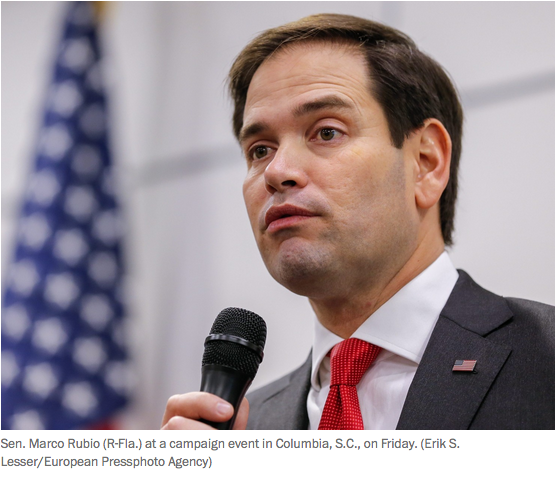What boxer Sonny Liston’s manager said of him (Sonny had his good points, the trouble was his bad points) is true of Marco Rubio. His strengths include intelligence, articulateness and, usually, cheerfulness. His misjudgments involve, in ascending order of importance, the Senate immigration bill of 2013, sugar, Libya and S . 590. Together these reveal a recurring penchant for ill-considered undertakings.
Rubio’s retreat, under withering political heat, from the immigration bill was undignified but not reprehensible. The bill had 1,197 pages because the 906-page Affordable Care Act had not slaked the congressional appetite for “comprehensive” solutions to complex problems. The immigration bill solved everything , down to the hourly wage of immigrant agricultural sorters ($9.84). Rubio shared this serene knowingness.
His sugar addiction is a reprehensible but not startling example of the routine entanglements of big government and big business. He has benefited from the support of Florida’s wealthy sugar producers, who have benefited from sugar import quotas and other corporate welfare that forces Americans to pay approximately twice the world price for sugar. What is, however, startling is Rubio’s preposterous defense of this corporate welfare as a national security imperative: Without our government rigging the sugar market, “other countries will capture the market share, our agricultural capacity will be developed into real estate, you know, housing and so forth, and then we lose the capacity to produce our own food, at which point we’re at the mercy of a foreign country for food security.”
This promiscuous invocation of national security brings us to Rubio’s enthusiastic support of the Barack Obama/Hillary Clinton intervention in Libya, which Rubio faults for having been insufficiently enthusiastic. This 2011 plunge into a tribal society’s civil war, this eight-month assassination attempt using fighter bombers, this supposedly humanitarian imperialism appealed to Secretary of State Clinton and other progressives precisely because it had no discernible connection to any vital U.S. interest. Rubio supported this third adventure in regime change in the Muslim world since 9/11, perhaps on the principle that practice makes perfect.
Today, his sensible complaint is that the Obama administration (like the previous administration regarding Iraq) had no plans for preventing chaos after the Libyan regime was decapitated. His not-at-all sensible implication, however, is that the United States should have buckled down to nation-building there.
Source: George F. Will, https://www.washingtonpost.com
 Listen Online
Listen Online Watch Online
Watch Online Find a Station in Your Area
Find a Station in Your Area









 Listen Now
Listen Now Watch Online
Watch Online
